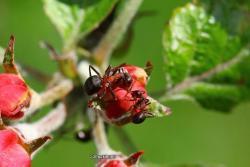Environment
"Ants on the plants" might protect crops from diseases
By Ben Coxworth
October 18, 2019

Wood ants foraging within an apple orchard
Jens Henrik Petersen
Although some gardeners may be put off by the sight of ants on their flowers, a new study indicates that the insects can be very effective at protecting crops from diseases. It's even being suggested that ant-derived antibiotics could be applied on a commercial scale.
Ants live in crowded colonies where they're constantly in close contact with one another, potentially allowing for the quick spread of disease. For this reason, they secrete antibiotics from glands on their body, plus they also cultivate colonies of antibiotic-producing beneficial bacteria on their legs. Those antibiotics may in turn get transferred onto plants.
In a previous study, it was found that when wood ants moved into an apple orchard, there was a notable reduction in two bacterial plant diseases – namely scab and apple rot. Inspired by this finding, researchers from Denmark's Aarhus University looked through other scientific literature, uncovering evidence that ants may inhibit at least 14 such diseases. On average, throughout the various studies reviewed, the presence of ants reduced pathogen levels by 59 percent.
"We don't yet know how the ants cure the plants," says lead scientist Joachim Offenberg. "But we do know that the ants secrete pheromones on their trails on the plants to find their way. And we know that some of these have antibiotic properties. The curing effect on plant diseases could be due to these pheromones."
And while it's unlikely that ants will ever be commercially "milked" for their antibiotics, it is nonetheless now hoped that manmade solutions based on those antibiotics may someday be applied to crops, providing an eco-friendly means of limiting the effects of harmful bacteria.
A paper on the research was published this week in the journal Oikos.
Source: Aarhus University via EurekAlert
